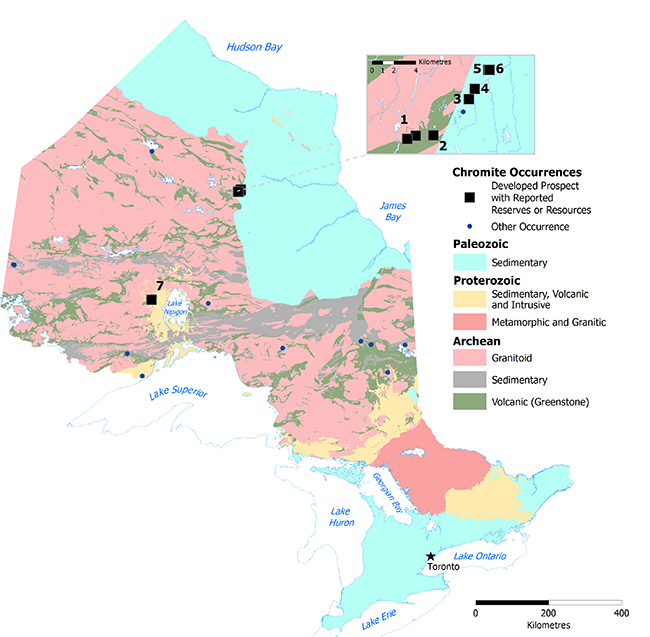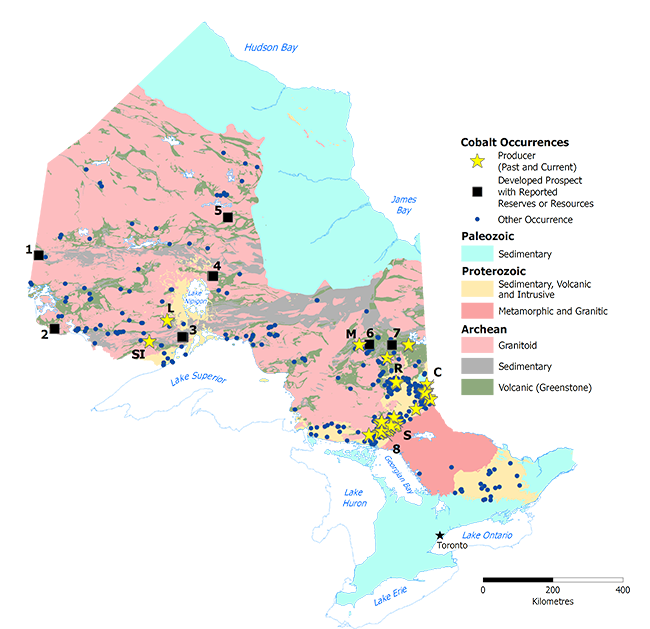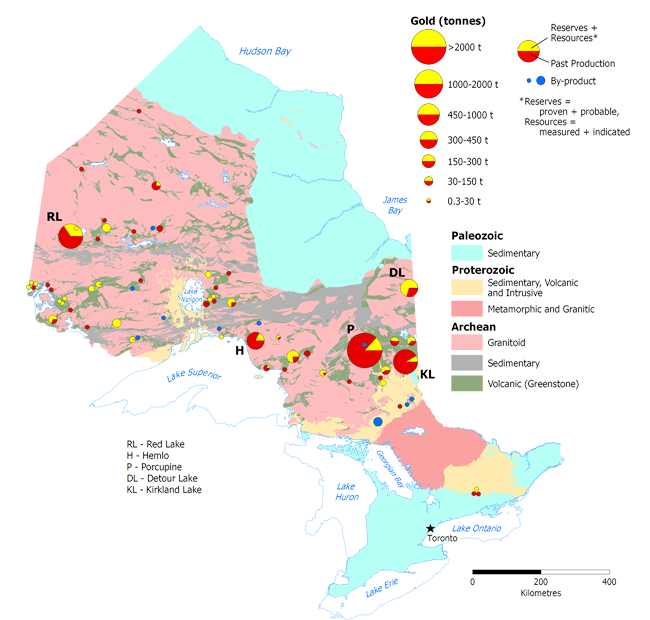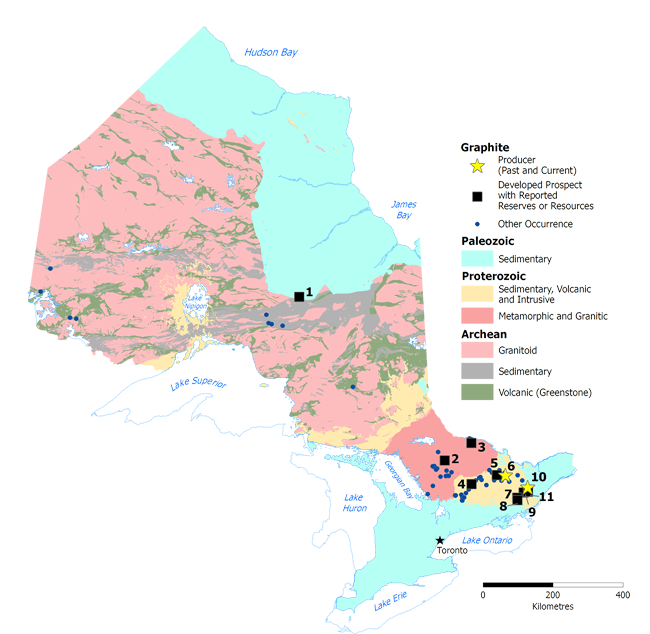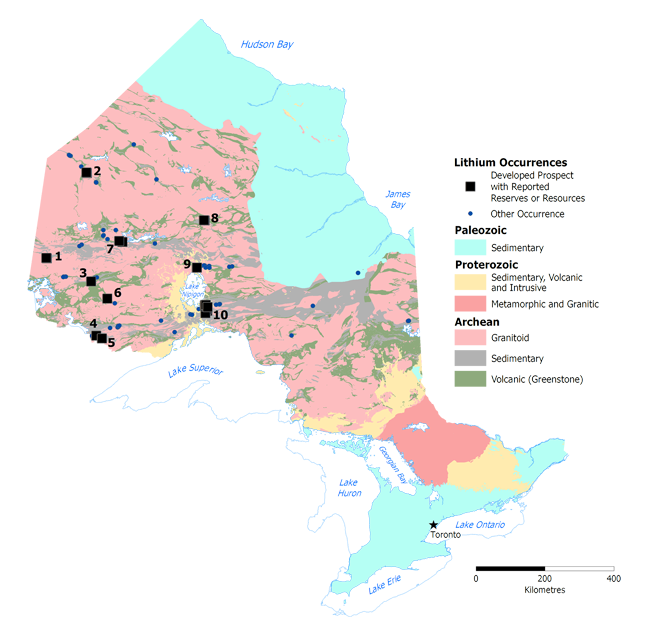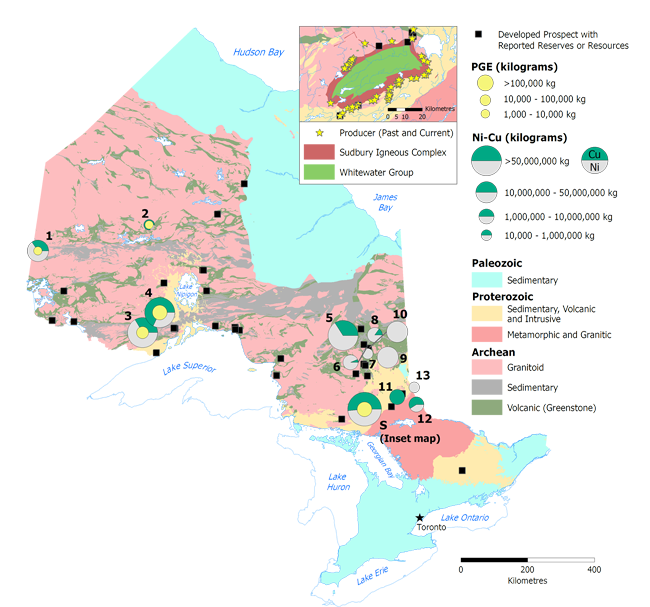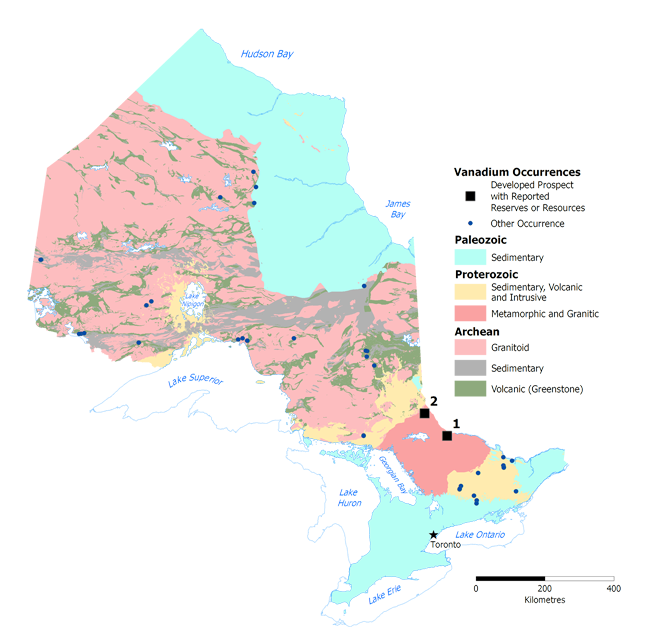Mineral exploration and production values and commodities
Learn more about our mining exploration and production activities and commodities.
Mineral exploration values
Highlights
Ontario is a world-class mining jurisdiction and is among the top 10 jurisdictions in the world for mineral exploration spending. Ontario is one of the leading producers of gold, copper, nickel and platinum group elements.
In 2024, gold was the most sought-after mineral in Ontario, with exploration spending of $603 million totaling 57% of the province’s total exploration spending.
Exploration spending in 2024
| Location | Exploration spending ($ million) | Percentage (%) |
|---|---|---|
| Off mine site | 828 | 78 |
| On mine site | 239 | 22 |
| Total | 1,067 | 100 |
Exploration spending by mineral, including critical minerals
Ontario is well-positioned to be a global supplier of critical minerals with our vast supply of minerals, processing capabilities and world-class mining supply and services sector.
| Mineral | Exploration spending ($ million) | Percentage (%) |
|---|---|---|
| Gold | 603 | 57 |
| Base metals | 382 | 36 |
| Other critical minerals (platinum group elements (PGE), lithium (Li), cobalt (Co), etc. | 78 | 7 |
| Other non-critical minerals (silver (Ag), iron (Fe), diamond, etc. | 4 | >1 |
| Total | 1,067 | 100 |
Note: data was aggregated to preserve confidentiality, numbers may not add up due to rounding.
Source: Natural Resources Canada
Mining lands activity
As of December 31, 2024, there were more than 364,000 active mining claims in Ontario.
You can acquire and register mining claims, obtain or renew a prospector’s licence and maintain your mining lands online 24/7 through the Mining Lands Administration System (MLAS).
World’s largest mining capital market: TSX & TSX-V
Toronto, Ontario is the mining finance capital of the world.
The Toronto Stock Exchange (TSX) and Toronto Venture Exchange (TSX-V) list more mining companies than any other exchange with over 1,100 listed in 2024. The Toronto Stock Exchange and Toronto Venture Exchange are first among exchanges worldwide in equity capital raised and are home to about 40% of the public mining companies in the world.
Ontario’s investment advantages
- Global leader in mining
- Open to global investment
- Committed mining communities
- Political stability
- Competitive business costs and tax regime
- Education and training network
- 100+ years of mineral production
- Government funding and support
- Canadian economic powerhouse
- Diverse and widespread mineral deposits
Mineral production values
Highlights
Ontario is one of Canada’s top mineral producers, generating $13 billion worth of minerals in 2024 – representing 24% of Canada’s total mineral production value.
Gold production in Ontario
With a market value of $7 billion, Ontario mines produced 2.5 million troy ounces of gold in 2024.
In 2024, 42% of Canada’s total gold production value came from Ontario.
Production and exploration by critical mineral type
Chromite
The Ring of Fire, in the Far North of Ontario, has the second largest chromite deposit globally in terms of tonnes of ore resources.
Cobalt
In 2024, 1,106 tonnes of cobalt produced in Ontario mines were shipped for a market value of $31 million. This makes up 27% of Canada’s cobalt production.
Copper
In 2024, 214,663 tonnes of copper produced in Ontario mines were shipped for a market value of $1,576 million. This represents 35% of Canada’s copper production.
Graphite
Ontario has several active graphite exploration programs.
Lithium
Ontario has several hard-rock lithium deposits that are being actively explored in the hopes of eventually supplying raw materials for electric vehicle batteries.
Nickel
In 2024, Ontario mines produced 50,003 tonnes of nickel, which were shipped at a market value of $1,041 million. This represents 38% of Canada’s nickel production by value.
PGE
In 2024, Ontario produced 72% of Canada’s PGE
Vanadium
Ontario has vanadium exploration potential in Southeastern Ontario.
Chromite
Highlights
Chromite is the major ore mineral of chromium.
Chromium is an essential component in the fabrication of alloys in in stainless steel and is used in many manufacturing processes because of its resistance to rust, shiny appearance and very high melting point.
Current estimates suggest the Ring of Fire has multi-generational potential of chromite production and significant potential production of nickel, copper and platinum.
Map of chromite occurrences in Ontario
| Location | Name |
|---|---|
| 1 | Blackbird 1 and 2 |
| 2 | Black Horse |
| 3 | Big Daddy Chromite |
| 4 | Black Creek |
| 5 | Black Thor |
| 6 | Black Label |
| 7 | Chrome Lake |
Cobalt
Highlights
In 2024, Ontario mines produced an estimated 1,106 tonnes of by-product cobalt, which were shipped at a market value of $31 million. This represents 27% of Canada’s cobalt production by value.
118,227 tonnes of cobalt shipments have been produced in Ontario between 1904 and 2024.
Cobalt is a critical element in lithium-ion batteries and other clean technologies. Demand for this strategic commodity is expected to increase in the coming years as the market for electric vehicles grows.
The town of Cobalt, Ontario, known for its significant historical silver and cobalt production, is a national heritage site and is considered the birthplace of Canadian hard-rock mining.
Map of cobalt occurrences in Ontario
| Location number | Name |
|---|---|
| 1 | Werner Lake Cobalt |
| 2 | Nicobat Project |
| 3 | Thunder Bay North & Escape Lake Deposits |
| 4 | VW & B4-7 Deposit |
| 5 | Norton Lake Cu-Ni-PGE Deposit |
| 6 | Hollinger Zone |
| 7 | Dundonald South Deposit |
| 8 | Lockerby Mine |
| C | Cobalt-Gowganda Camp |
| L | Lac des Iles |
| M | Montcalm Mine |
| R | Redstone and McWatters Mines |
| S | Sudbury Camp |
| SI | Shebandowan Inco Mine |
Gold
Highlights
Gold is the most sought-after mineral in Ontario, topping the charts with exploration spending of $603 million or 57% of the province’s total exploration spending in 2024.
In 2024, Ontario mines produced 2.5 million troy ounces of gold, which were shipped at a market value of $7 billion. This represents 42% of Canada’s gold production by value.
Ontario is home to 18 producing gold mines and 12 significant gold exploration projects.
With more than 30 mineral deposits each having more than 500,000 troy ounces of gold (measured and indicated resources inclusive of reserves) located in traditional camps and beyond, Ontario has plenty of resources for the future.
Map of gold occurrences in Ontario
Graphite
Highlights
Ontario has several advanced exploration projects and active graphite exploration programs.
The Black Donald Mine, located approximately 100 kilometres southwest of Ottawa, produced 77,000 tonnes of graphite between 1896 and 1954 which is approximately 75% of Ontario’s graphite production to date.
Graphite has been used traditionally in high-temperature lubricants, electrical motors and batteries. New uses are being discovered for graphite including lithium-ion batteries, solar power and electric vehicles.
Demand for this strategic commodity is expected to increase as the market for batteries to power electric vehicles and other clean technologies grows.
Map of graphite occurrences in Ontario
| Map Number | Name |
|---|---|
| 1 | Albany Graphite |
| 2 | Kearney Graphite Mine |
| 3 | Bissett Creek Graphite Project |
| 4 | National Graphite Ltd. |
| 5 | Beidelman and Lyall Property |
| 6 | Black Donald Mine |
| 7 | Meadow Lake Zone |
| 8 | Stewart Lake |
| 9 | N. A. Timmins Mine |
| 10 | Globe Graphite Mine |
| 11 | Portland Graphite |
Lithium
Highlights
Lithium is found in most battery-operated items, such as smartphones, portable computers and electric vehicles.
Lithium is also used in glass and ceramics to increase strength and durability, especially at high temperatures.
Demand for this strategic commodity is expected to increase in the coming years as the market for batteries that power electric vehicles and other clean technologies grows.
Ontario has hard-rock lithium deposits that are being explored actively.
Map of lithium occurrences in Ontario
| Map number | Name |
|---|---|
| 1 | Big Mack and Separation Rapids |
| 2 | PAK and Spark Pegmatite |
| 3 | Mavis Lake |
| 4 | Wisa Lake North Zone |
| 5 | International Lithium |
| 6 | Raleigh Lake |
| 7 | Root Bay and McCombe |
| 8 | Rubellite and Pollucite Dikes |
| 9 | North and South Aubry |
| 10 | Georgia Lake area pegmatites |
Nickel, copper, platinum group elements (Ni-Cu-PGE)
Nickel (Ni)
In 2024, Ontario mines produced 50,003 tonnes of nickel, which were shipped at a market value of $1,041 million. This represents 38% of Canada’s nickel production by value.
Nickel is an important metal used in the manufacturing of stainless steel, high-strength alloys, aerospace components and construction materials.
Copper (Cu)
In 2024, Ontario mines produced 214,663 tonnes of copper, which were shipped at a market value of $1,576 million. This represents 35% of Canada’s copper production by value.
The average home contains approximately 181.4 kilograms of copper that is used for electrical wiring, pipes and appliances.
Platinum Group Elements (PGE)
In 2024, Ontario mines produced 547,716 troy ounces of PGE
Platinum and palladium are essential elements in the production of catalytic converters, medical and dental equipment, as well as jewellery.
Map of nickel, copper, platinum group elements occurrences in Ontario
| Location | Name |
|---|---|
| 1 | Gordon Lake Mine |
| 2 | Thierry Mine |
| 3 | Shebandowan (INCO Mine) |
| 4 | Lac des Iles Mine |
| 5 | Montcalm Mine |
| 6 | Redstone Mine |
| 7 | Texmont Mine |
| 8 | Alexo Mine |
| 9 | McWatters Mine |
| 10 | Langmuir Mine |
| 11 | Temagami Copper Mine |
| 12 | Kanichee Mine |
| 13 | Keeley-Frontier Mine |
| S | Sudbury Camp |
Vanadium
Highlights
Vanadium is used in the production of steel to add strength and heat resistance. Approximately 80% of all vanadium produced goes into making steel. Ontario has hard-rock vanadium deposits that are being actively explored.
Demand for this strategic commodity is expected to increase in the coming years. This is due to the market growth for liquid vanadium redox-flow batteries that can store large amounts of power generated by solar and wind farms and other clean technologies.
Map of vanadium occurrences in Ontario
| Location | Name |
|---|---|
| 1 | Brazeau Prospect |
| 2 | Titan Property |
Contact us
For more information about Ontario’s mineral resources:
Footnotes
- footnote[1] Back to paragraph Base metals include: copper, nickel and zinc.
- footnote[2] Back to paragraph Other critical minerals include the remaining minerals on the Ontario critical minerals list.
- footnote[3] Back to paragraph Other non-critical minerals excludes gold and all other minerals on the Ontario critical minerals list.
- footnote[4] Back to paragraph PGE include platinum (Pt), palladium (Pd), rhodium (Rh), ruthenium (Ru), iridium (Ir) and osmium (Os).
